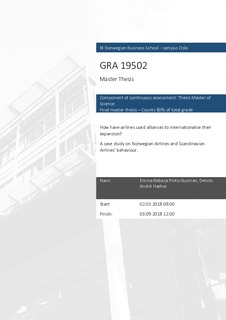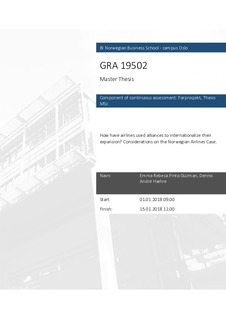How have airlines used alliances to internationalise their expansion? : A case study on Norwegian Airlines and Scandinavian Airlines’ behaviour
| dc.contributor.author | Guzman, Emma Rebeca Pinto | |
| dc.contributor.author | Hæhre, Dennis André | |
| dc.date.accessioned | 2018-12-19T13:40:22Z | |
| dc.date.available | 2018-12-19T13:40:22Z | |
| dc.date.issued | 2018 | |
| dc.identifier.uri | http://hdl.handle.net/11250/2578346 | |
| dc.description | Masteroppgave(MSc) in Master of Science in Business, Strategy - Handelshøyskolen BI, 2018 | nb_NO |
| dc.description.abstract | This final paper proposes a framework which reviews strategic alliances in the context of the Airlines Industry and puts in contrast the two largest Nordic airlines. Strategic alliances, in this sight, are part of the internationalisation strategy of SAS, founding member of Star Alliance, one of the world’s largest airline alliances. On the other hand, Norwegian focuses on solo expansion. A literature review on strategic alliances, alliance portfolio, internationalisation and legitimation has been made to set a theoretical background. Specifically, for this analysis, propositions have been discussed to assess what the analysis has proposed to be the advantages or disadvantages of strategic alliances. Finally, conclusions, limitations and future research proposals are presented. | nb_NO |
| dc.language.iso | eng | nb_NO |
| dc.publisher | Handelshøyskolen BI | nb_NO |
| dc.subject | strategi | nb_NO |
| dc.subject | strategy | nb_NO |
| dc.title | How have airlines used alliances to internationalise their expansion? : A case study on Norwegian Airlines and Scandinavian Airlines’ behaviour | nb_NO |
| dc.type | Master thesis | nb_NO |
Tilhørende fil(er)
Denne innførselen finnes i følgende samling(er)
-
Master of Science [1621]

